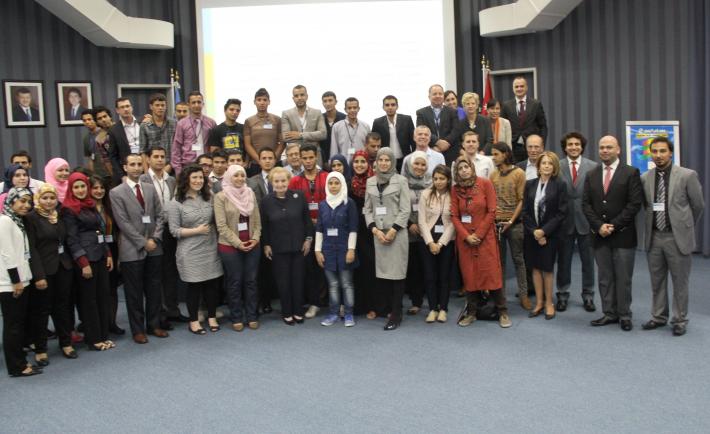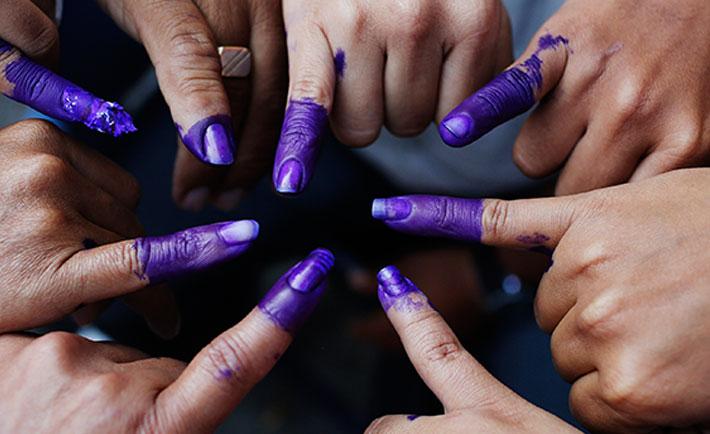In Jordan, NDI is using an innovative program to help young people use democratic methods and community action to become invested in their nation’s future. Through “Ana Usharek” (“I Participate”), university students throughout the country are learning about democratic values and political systems, human rights, non-violent dispute resolution, and civic responsibility.
How does increased youth participation in politics improve a society?
Young Women. Fresh Voices. The Future of Democracy.
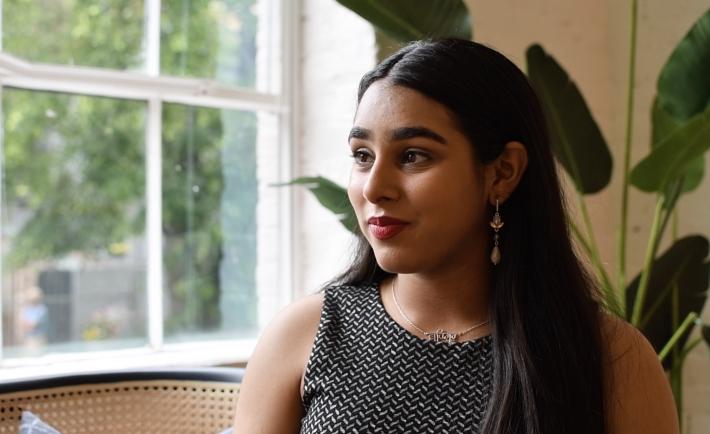
Tarina Ahuja is a high school senior, a political activist and co-founder of the nonprofit Young Khalsa Girls.
The DemWorks Podcast and Video series will extend International Youth Day (August 12) to celebrate and amplify the political engagement of young women and young men throughout the month of August. In this episode, Molly Middlehurst, Senior Program Officer on the Gender, Women and Democracy team at NDI, speaks to the inspirational Tarina Ahuja.
Gender-Sensitive Governance: The Missing Ingredient for Resilient Cities
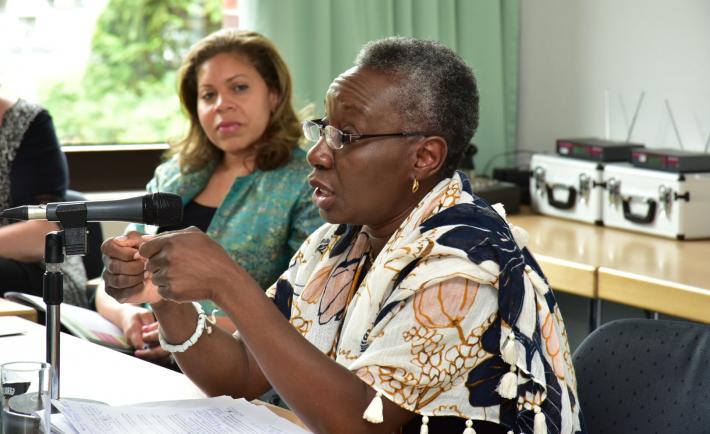
Rockefeller Foundation's Sundaa Bridgett-Jones listens to NDI's Sandra Pepera at ICLEI's Resilient Cities Forum in Bonn in July 2016. Photo Credit: ICLEI-Local Governments for Sustainability
More than half of the world’s population now lives in urban areas. As the forces of globalization rapidly draw more people to urban centers in search of socioeconomic opportunity, we must ask: How do we ensure our cities are safe, sustainable and resilient?
When considering city resiliency, we think immediately of physical necessities: will people have access to clean water, sturdy buildings, safe roads and public transport? Will the city be environmentally sustainable, and be able to weather and recover from natural disasters?
Resilience, though, isn’t only about civil engineering -- it’s also about politics and governance. Inclusive and responsive democracies minimize insecurity and help protect particularly vulnerable community members from potential shocks and stressors. Democracies based on these values guard against instability and conflict and work to address the needs of their populaces, especially in circumstances where the population is diverse and may have competing interests.
Not Just Observation, Guatemala Election Monitoring Opens Doors to Dialogue and Civic Education
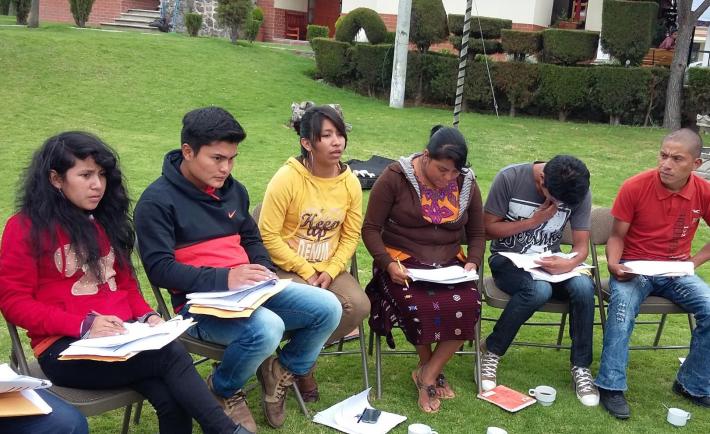
Milvia Roxana Lopez (third from left) speaks during a training for citizen election observers in Guatemala. “Self-confidence was key,” she said, referring to her ability to break through gender-based stereotypes as an election observer documenting incidents of violence and educating voters during last year’s historic elections.
At 25 years old, Milvia Roxana López, an indigenous woman, may be diminutive in size but she exudes a confidence that demands she be heard. As an observer who monitored electoral violence, Milvia met with leaders from her town and surrounding communities to document acts of electoral violence -- not an easy topic to broach in country that has one of the highest homicide rates in the world. “For me, self-confidence was key,” declared Milvia, referring to her role as an election observer. “To many people, it’s not the same when a woman says something as when a man says something. I don’t know where I got the strength, but I did it.”
Global Women's Leadership Program Brings Women MPs to World Bank 2016 Fragility Forum
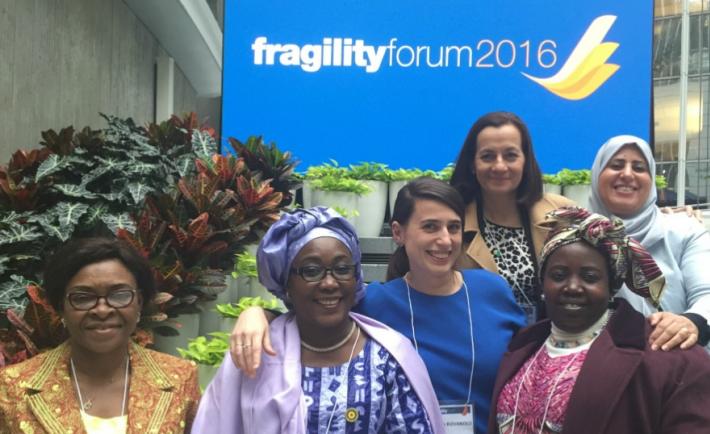
After the delegates' closing remarks at the 2016 Fragility Forum, from left to right: Stella Ngwu (Nigeria), Aissata Toure Diallo (Mali), Besa Rizvanolli (NDI), Clara Rojas (Colombia), Sabina Dario Lokolong (South Sudan), Dr. Sultana Mismari (Libya)
In fragile and violent places, whether it is Colombia, Libya, Mali, Nigeria, or South Sudan, the role of women during crisis, war, and post-conflict reconstruction has been critical. Conflicts often force women to get organized and to safeguard the basic necessities that bolster day-to-day life in each family. They also participate in fighting wars, and in rebuilding their communities. Women act as peacekeepers, relief workers, and mediators. Yet, when peace talks occur, women are not invited to the table and peace agreements are often drafted without the critical perspectives of women.
With this reality in mind, under USAID’s Global Women’s Leadership Program (GWLP), NDI brought a delegation of women members of parliament (MPs) to the World Bank Group Fragility Conflict and Violence Forum 2016 (also referred to as the Fragility Forum) in Washington, DC in early March.
Global Women's Leadership Program Brings Women MPs to COP21
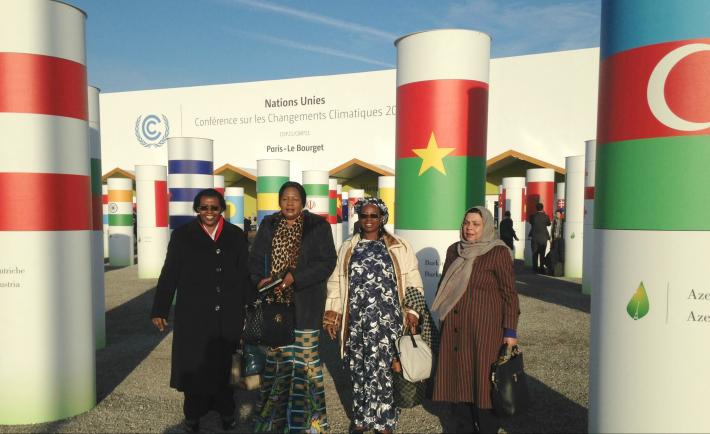
Members of the GWLP delegation of women parliamentarians to the COP21 Summit in Paris, from left to right: Margaret Nantongo Zziwa, Uganda; Ake Camille Epse Akoun, Ivory Coast; Joséphine Drabo Kanyoulou, Burkina Faso; and Tayeba Zahidi, Afghanistan. Photo by Aretha Francis.
Under the Global Women's Ledership Program supported by USAID, NDI sent four women parliamentarians to the COP21 climate change summit in Paris.
A Look Back at our International Democracy Day Tweettalk
In recognition of International Day of Democracy, NDI partnered with the International Republican Institute (IRI) and International Foundation for Electoral Systems (IFES) to host an online discussion. Kenneth Wollack, president of NDI, Michael D. Svetlik, vice president for programs at IFES, and Tom Garrett, vice president for programs at IRI, answered eight democracy-related questions posed by @CEPPS and other TweetTalk participants. Using the hashtag #DemTalk, respondents discussed both general shifts in democratic trends across the world and specific examples of programs that create “space for civil society” -- the theme of this year’s Democracy Day.
Four New Resources for Strengthening Citizen Access
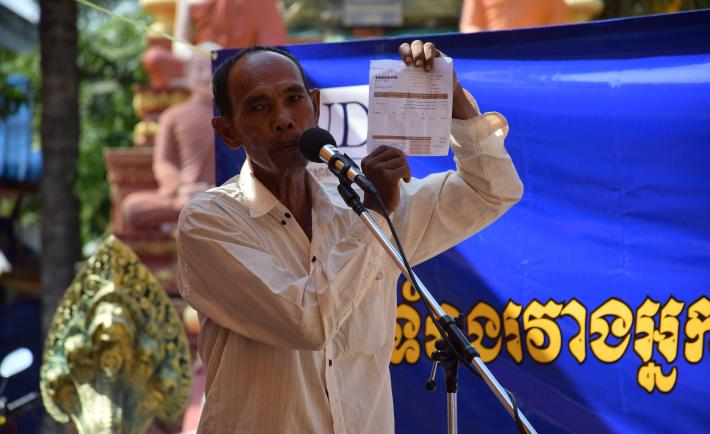
At a constituency dialogue event in Cambodia, a participant displays his electricity bill to show members of the National Assembly how expensive energy is in his village, and asks them for a solution to rising costs. NDI helped organize the constituency dialogue event. (Photo by NDI's Chhiv Kimsrun)
Citizen access and influence in political decision-making can vary across identity groups. NDI programming helps citizens expand civic space and streamline processes to enhance their own political participation, with a cross-cutting priority to support the inclusion of historically marginalized populations. This past month’s resources discussed the need to lower barriers to voter registration for people with disabilities, how to partner with faith-based organizations and religious leaders, and the use of ICTs in women’s empowerment. In August, the Citizen Participation team and the Political Parties team organized a ‘TweetTalk’ on what political parties can do to include youth in the political process.
Votes without Violence: Strengthening Electoral Integrity
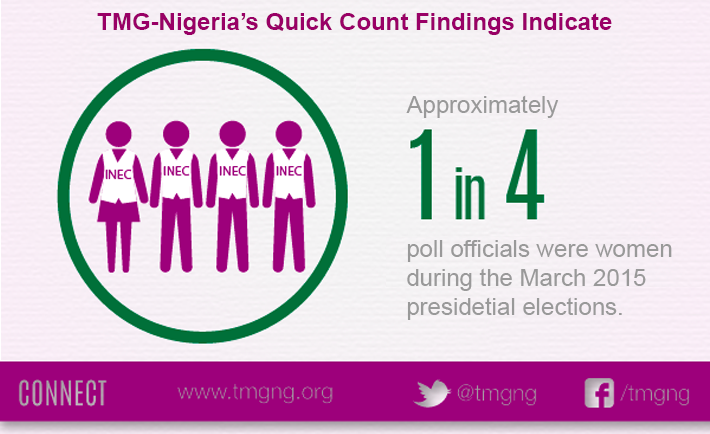
NDI’s domestic observation partner in Nigeria, TMG, reported that 1 in 4 election officials for the 2015 presidential and legislative elections were women.
There’s something new in the Gender, Women and Democracy (GWD) program at NDI. In evaluating existing programming within the democracy and governance community, the GWD team found a gap. As we examined the social, political, and economic barriers preventing women from participating fully in democratic governance, we found that one such barrier -- violence against women in elections (VAW-E) -- was absent from the conversation, largely because it had not been distinguished from wider studies of electoral violence. So, in partnership with NDI’s election team, and with funding from the National Endowment for Democracy, GWD is putting VAW-E on the map.

